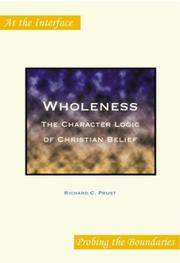| Listing 1 - 3 of 3 |
Sort by
|

ISBN: 9789004495227 9789042010888 Year: 2004 Publisher: Leiden;Boston BRILL
Abstract | Keywords | Export | Availability | Bookmark
 Loading...
Loading...Choose an application
- Reference Manager
- EndNote
- RefWorks (Direct export to RefWorks)
The notion of a "person" is in deep philosophical trouble. And this has posed a deepening crisis for believers: Christian beliefs are, after all, irreducibly about persons. In response to this situation, Prust proposes a new way to reason about persons, one based on identifying persons as characters of action. Employing a phenomenology of action he calls "character logic," he develops a powerful new tool for thinking through some of the intractable dilemmas that have long befuddled belief: • Can we avoid being arbitrary and parochial in claiming that God is the only source of moral value? • Can we reconcile natural evil in the world with God's absolute power? • Can we continue to honor the historicity of faith-based claims in the face of critical history? • Can our personal life be eternal when neither timeless nor everlasting life is conceivable? • Can we accept our personal mortality and still affirm our destiny as eternal? Wholeness: The Character Logic of Christian Belief argues that character logic shows us a reasonable way to think about persons, one that puts theology on a new footing and gives affirmative answers to all these questions!.
Human acts --- Personalism --- Theological anthropology --- Christianity

ISBN: 9042010886 9004495223 Year: 2004 Publisher: Amsterdam Rodopi
Abstract | Keywords | Export | Availability | Bookmark
 Loading...
Loading...Choose an application
- Reference Manager
- EndNote
- RefWorks (Direct export to RefWorks)
Book
ISBN: 1622737474 9781622737475 9781622736287 1622736281 Year: 2019 Publisher: Wilmington, DE Vernon Press
Abstract | Keywords | Export | Availability | Bookmark
 Loading...
Loading...Choose an application
- Reference Manager
- EndNote
- RefWorks (Direct export to RefWorks)
Many questions about moral and legal judgments hinge on how we understand the identity of the agents. The intractability of many of these questions stems, this book argues, from ignoring how we actually connect actions with agents.When making everyday judgments about the morality or legality of actions, we do not use Aristotelian logic but what is termed "character logic". The difference is crucial because implicit in character logic is an understanding of personal identity that is both coherent and intuitively familiar. A person, as we conceptualize him in moral and legal contexts, is a character of resolve. By unpacking what it means to be a character of resolve, this book reveals what underwrites our most fundamental beliefs about a person's rights and responsibilities. It also provides a new and useful perspective on a variety of issues about rights and responsibilities that perennially occupy philosophers. This book discusses the following:• How we can make better sense of "human rights" if we think of them as "personal rights".• How the right to be civilly disobedient, in contrast with ordinary law-breaking, can be justified as a personal right.• What basis we have for holding that someone's responsibility is diminished.• How it makes sense to hold someone responsible for acting irresponsibly.• How it makes sense to distinguish a juvenile offender from someone who should be tried in criminal court.• What kind of correction we should expect from our correctional institutions and how we should design them to achieve that.By making explicit the axioms of character logic and exploring their origins and justification, the book provides a conceptually powerful tool for interpreting the protocols of a person-respecting society.
Self (Philosophy) --- Identity (Psychology) --- Personal identity --- Personality --- Self --- Ego (Psychology) --- Individuality --- Philosophy --- Personalism. --- Personnalisme.
| Listing 1 - 3 of 3 |
Sort by
|

 Search
Search Feedback
Feedback About UniCat
About UniCat  Help
Help News
News